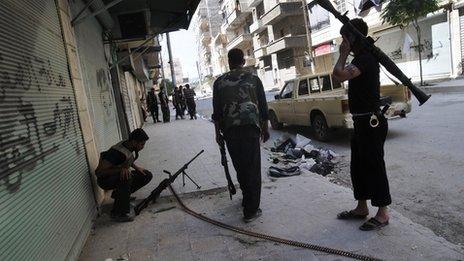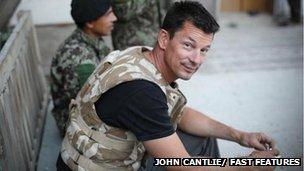Syria conflict: British fighters seek jihad
- Published

"Mainstream rebel groups" in Syria do not want foreign forces
However vague the picture in Syria may have been before this conflict began, the blood of many thousands has now muddied it further still.
But in this complex web of armed civilians, defected soldiers, paramilitary units and bloodthirsty militias, a further dynamic is growing in strength: militants from outside Syria joining the fray.
Foreign fighters have been heading to Syria for some time - many of Syrian descent but living in Europe or the US, keen to help their brothers in arms. A similar pattern emerged in Libya, where young western Libyans joined the battle against [late leader Col Muammar] Gaddafi.
However, a different, more dangerous contingent is joining this struggle now.
Militant groups thought to be linked to al-Qaeda are operating in the country. Among their ranks, a small number of young British men - at this stage, probably only running into the dozens - are joining this fundamentalist fringe, having been recruited from towns and cities across the UK.
'Thrill seekers'
Driving along the Asian district of Coventry Road in his Birmingham constituency, local MP Khalid Mahmood explained that from amongst the Muslim communities in Britain that have embraced the Syrian cause, a small number have taken their grievances a step further.
"I'm extremely concerned at the moment because I see similar things to those that happened in Afghanistan. We encouraged people to fight - to fight for the jihad. In the Syrian situation, similar messages are going out. Quite a number in Birmingham are heading out.
"Some are of Syrian origin, others of South Asian origin - for whom religion is the main pull. As this conflict goes on, I would anticipate greater numbers going forward."
Malik al-Abdeh, a prominent Syrian journalist based in the UK, explained why the conflict in Syria has pulled in these young fighters.
"Most of these people are essentially thrill-seekers wanting to experience the jihad, which for some people is a lot of fun. They get to carry a gun for the first time in their lives. They get trained up and it's exciting.
"I think it's inevitable that people from the UK would go to Syria. Fighting for God and fighting for Islam is one of the pillars of being a Muslim.
"There was an opportunity against the Soviets in Afghanistan, against the Russians in Chechnya, against the Serbs in Bosnia and now against the Alawites in Syria.
"They see it as another stop on the jihadi tour, if you like. And they have to be there otherwise they are missing out on a big opportunity."
Language barrier
So far, says Mr Abdeh, the numbers are limited because mainstream rebel groups do not want them in the country.
"The phenomenon so far of non-Syrians going to fight in Syria is quite limited simply because people within Syria don't want those people coming to fight.
"Actually these foreigners hamper the effort. You have the language barrier, different cultures and no knowledge of the local area."

Photojournalist John Cantlie says there were Britons among his captors
But their differences could grow into armed confrontation, as British photographer John Cantlie found after having been abducted by an extremist group in Syria. It was the Free Syrian Army (FSA) who rescued him. He paints a similar picture of embittered and disillusioned British youths seeking to find purpose.
"They were hostile to us, I believe, because many of these were disenchanted young men from Britain. And I believe we represented everything that they were disenchanted about.
"They were young, they were impressionable and they were united under an extremist flag in Syria. And I think the sight of genuine western hostages excited them; it fulfilled their concept of what jihad was about."
Legacy of conflict
These young Brits are a prime target for an al-Qaeda leadership keen to show its relevance in a region where peaceful, rather than armed protest, had been the trend.
Peter Neumann, professor of security studies at King's College, explained the attraction for al-Qaeda in Syria and the battle against President Assad.
"This is not just about a secular dictator. This is about a secular dictator considered to be a Shia. So there is a sectarian dimension. For a lot of extremist Sunni Arabs, this has particular significance and it may motivate them more perhaps than European jihadists who are supportive, but not yet coming in big numbers."
While the numbers remain small, Professor Neumann pointed to experiences in Afghanistan, where foreign fighters hijacked a fight that was not their own.
For the moment, extremist groups in Syria are not a significant threat. But as the situation deteriorates and the structures keeping the state intact start to crumble, these small groups may get the chance to grow.
"As in Afghanistan in the 80s, the foreign fighters - the (Osama) Bin Laden types - were the small minority," says Prof Neumann. "But afterwards, they claimed the legacy of that conflict."